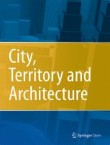City, Territory and Architecture welcomes submissions to the thematic series - Inclusive Cities and Learning Territories
The Special Issue “INCLUSIVE CITIES and LEARNING TERRITORIES” opens a debate on the effects of mass movement of people and cultures in urban and territorial transformation processes such as permanence and movement, localism and cooperation, progress and regression, concentration of wealth and new forms of poverty, and individualism and new solidarity, etc.
If urban territories are learning spaces, how do they encourage learning processes for their inhabitants? How do they allow them to be aware of the constant movement caused by flows of people due to global interdependencies, the effects of climate change, different wealth distributions, the results of development cooperation failures, etc.?
Which strategies and actions can be projected in the cities to deal with these complex dynamics that generate more and more social inequalities, spatial injustices, expulsions, and new approaches to security on an international level?
To deal with these challenges, it is crucial to have a proper awareness of what can be defined as “citizenship”. From the perspective of authors, citizenship is considered a life project, a collective form and capacity for self-determination. It is a social project which takes place in inclusive cities. This gives rise to dynamic processes of collective learning which depends on quality of places, within a strong relationship between different populations, welcoming urban space, and inclusive public policies. It is about a sense of social responsibility that can produce a different urban perspective fostering new forms of coexistence and solidarity. In addition, new methods of cooperation between different countries can be it oriented through these fundamental standpoints.
Learning cities are inclusive cities: on the one hand they are highly dependent on the micro-diversities of local cultures, symbolic worlds, and implicit local knowledge. On the other hand, they open up a dialogue with the multiplicity of contexts with which they relate to, stimulating innovative forms of interaction between cultures.
The Special Issue investigates research, case studies, projects, and new models of cooperation between territories which can generate new collective intelligence and social awareness within territories. One that is open to the challenges of the contemporary world and that acts to redesign rights, responsibilities, and a sense of belonging.
Submission Instructions
Before submitting your manuscript, please ensure you have carefully read the submission guidelines for City, Territory and Architecture. The complete manuscript should be submitted through the City, Territory and Architecture submission system. To ensure that you submit to the correct thematic series please select the appropriate thematic series in the drop-down menu upon submission. In addition, indicate within your cover letter that you wish your manuscript to be considered as part of the thematic series on "Inclusive Cities and Learning Territories". All submissions will undergo rigorous peer review and accepted articles will be published within the journal as a collection.
Lead Guest Editors
Silvia Serreli
DADU, University of Sassari, Italy
Abdesselem Mahamoud
ENAU Université de Carthage, Tunisia
Submissions will also benefit from the usual advantages of open access publication:
- Rapid publication: Online submission, electronic peer review and production make the process of publishing your article simple and efficient.
- High visibility and international readership in your field: Open access publication ensures high visibility and maximum exposure for your work - anyone with online access can read your article
- No space constraints: Publishing online means unlimited space for figures, extensive data and video footage
- Authors retain copyright, licensing the article under a Creative Commons license: articles can be freely redistributed and reused as long as the article is correctly attributed
For editorial enquiries please contact editorial@cityterritoryarchitecture.com.
Sign up for article alerts to keep updated on articles published in City, Territory and Architecture - including articles published in this thematic series!
